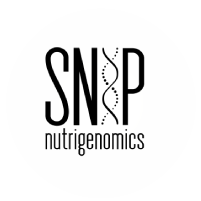Cold and Flu Season: Strengthen Your Immune System with Genetic Insights
Cold and flu season doesn’t have to mean surrendering to sniffles and fatigue. In fact, it’s an ideal time to take a closer look at how your body responds to immune challenges — and how your genetics may play a part. At SNiP Nutrigenomics, we believe in taking a proactive, personalized approach. By understanding your unique genetic blueprint, you can make smarter lifestyle and nutrition choices to strengthen your immune system and address your body’s specific needs.
Promote Healthy Lifestyle Habits
The Role of Lifestyle in Immune Health
The foundation of a strong immune system starts with daily habits—sleep, movement, hydration, and stress management. Understanding how your genes influence how your body responds to these habits makes this even more powerful. With a little insight, you can tailor your routine for maximum immune benefit.
Sleep
Genes like GAD1 and TNF-α influence how restful your sleep is. GAD1 plays a role in producing GABA, a calming neurotransmitter essential for relaxation and restful sleep. Winding down at night can be difficult when this pathway isn’t functioning well. TNF-α is involved in inflammation, which, when elevated, can disrupt sleep cycles. For those with GAD1variants, tools like magnesium glycinate, valerian root, and calming nighttime routines can make a noticeable difference. Prioritizing 7–9 hours of quality sleep each night is one of the simplest and most impactful ways to support your immune system. Create a bedtime routine with mindfulness or deep-breathing exercises.
Movement and Exercise
Moderate exercise improves circulation, supports detox, and boosts immunity, but your genes may determine how your body responds to different types of movement. Variants in ADRB3 and PPARD can impact fat metabolism and recovery. If you tend to feel sluggish or have trouble bouncing back after workouts, gentler options like walking, cycling, or strength training may be more effective than intense exercise. Regular movement also helps reduce inflammation and support hormonal balance, which indirectly benefits immune function.
Hydration
Staying well-hydrated keeps your immune system functioning properly, and your genes can influence how your body handles hydration and nutrient transport. The SLC23A1 gene affects how your body absorbs and uses Vitamin C, which is crucial for immune defense. FUT2 , another important gene, influences gut hydration and B12 absorption, both of which are essential for resilience. Aim for 8–10 glasses of water per day, and consider adding a squeeze of lemon or an electrolyte tablet to boost absorption and hydration.
Stress Management
Stress takes a serious toll on the immune system — especially for those with certain genetic sensitivities. The COMT gene affects how quickly your body clears stress hormones like adrenaline, and MAOA plays a role in neurotransmitter balance. If these genes are less efficient, you might feel more affected by daily stressors or have a harder time calming down. Building in stress-relief practices like tai chi, yoga, journaling, and mindfulness can help restore balance. Adaptogenic herbs such as ashwagandha or Rhodiola rosea may be particularly helpful for those with high-stress gene profiles.
Focus on Key Nutrients for Immune Health
Nutritional Support Tailored to Your DNA
Your body relies on specific nutrients to keep the immune system strong, and your genetics may determine how well you absorb, use, or store these nutrients. Knowing where you may need additional support allows you to supplement smarter — not harder.
Vitamin C
The SLC23A1 gene is responsible for transporting Vitamin C throughout the body. Variants here may mean you don’t absorb it as well, increasing your need for dietary sources or higher-quality supplements. Include citrus fruits, strawberries, bell peppers, and broccoli in your meals, and consider buffered or liposomal Vitamin C if absorption is a concern.
Vitamin D
Your VDR gene determines how well your body uses Vitamin D, a key nutrient for immune resilience and inflammatory balance. Even with sun exposure or supplements, you may not get the full benefit if this gene isn’t functioning optimally. The CODE Complex™ includes a carefully calibrated dose of D3 (paired with K2) based on your genetics — ensuring your immune and bone health get the support they need.
Zinc
Variants in the SLC30A8 gene can impair zinc transport, which may affect immune cell activity and repair. If you have this variant, focus on zinc-rich foods like meats, seeds, and nuts, and consider zinc picolinate for enhanced absorption.
Selenium
This essential mineral supports antioxidant defenses through genes like GPX1 and GSTP1. If these genes are under-functioning, you may need more selenium to neutralize oxidative stress and protect your immune system. Brazil nuts, seafood, and whole grains are excellent sources, and targeted supplementation — such as selenium yeast found in the CODE Complex™ can provide additional support.
Highlight the Importance of Gut Health
Did you know that roughly 70% of your immune system is located in your gut? A healthy microbiome plays a vital role in keeping your defenses strong; your genes can help pinpoint exactly how to support it.
Genes like FUT2 and HLA-DQA1 are involved in how your body interacts with and maintains gut bacteria. Variants in FUT2 can lead to an imbalanced microbiome and make you more prone to digestive issues or immune sensitivity. Supporting gut health through prebiotics (such as garlic, onions, and green bananas) and probiotics (like Lactobacillus rhamnosus and Bifidobacterium longum) is especially important if you carry these gene variations. The CODE Complex™ also supports gut integrity and microbiome diversity through strategically selected ingredients.
Detox Pathways and Immune Protection
Your detox systems are responsible for clearing out toxins and byproducts that can compromise your immune function. Genes like GSTP1 and NQO1 help regulate this process, and variants may reduce your ability to manage oxidative stress.
If your genes suggest slower detox capacity, supporting these pathways with cruciferous vegetables like broccoli, kale, and Brussels sprouts is key. The CODE Complex™ includes sulforaphane-rich ingredients to help keep your detox pathways flowing and your immune system supported.
Immune-Supportive Supplements Backed by Your DNA
Using your genetics to guide supplement choices can be incredibly effective, especially during cold and flu season. Here are a few immune-boosting options that pair well with common genetic variants:
Echinacea supports immune activation and may help reduce symptoms, particularly beneficial for those with inflammation-prone variants in CRP, TNF-α, or IL6.
Elderberry Extract is rich in antioxidants and helps reduce cold. It’s especially useful for those with oxidative stress-related variants in PON1, GSTP1, SOD2, or GPX1.
Astragalus helps regulate the immune response and reduce inflammation. It’s a great fit for individuals with TNF-α variants who need extra immune system modulation.
A Day of DNA-Informed Immune Support
Here’s a simple sample day that combines food, movement, and supplements to support your immune system using your genetic insights:
In the morning, start with a smoothie made from spinach, frozen berries, and Vitamin D-enriched almond milk. Add in zinc picolinate and elderberry extract to kickstart immune activity. A short yoga or meditation session sets the tone for a balanced day.
At lunch, enjoy grilled salmon with a quinoa and roasted veggie salad. Stay hydrated with electrolyte water and lemon. A brisk walk after eating will support digestion and circulation.
For dinner, a turkey stir-fry with garlic, onions, and broccoli provides protein and antioxidant power. Wind down with herbal tea (chamomile or valerian) and a moment of mindfulness or journaling before bed. See our blog for more tips
Advanced Genetic Insights for Immune Optimization
Your DNA offers even deeper insights into how your body responds to immune challenges. For example, ACE variants can affect circulation and fluid balance, making hydration even more essential. IL6 and CRP Genes influence inflammatory responses, highlighting the need for antioxidant-rich foods and anti-inflammatory habits. Genes like MTHFR and MTRR impact methylation and energy production, which are critical for powering immune cells and maintaining resilience.
Conclusion: Personalize Your Immunity with SNiP
Cold and flu season is the perfect time to work with your body, not against it. By combining foundational lifestyle strategies with personalized insights from your DNA, you can build a truly resilient immune system that supports you all year long.
Take Action: Know Your Genes and Unlock Your Health Potential
Discover your genetic blueprint and take control of your health with SNiP Nutrigenomics. By testing with us, you can unlock insights into 103 high-impact, actionable genes, including those crucial for optimizing metabolism, Body Mass Index, and overall well-being. Already have your DNA data from companies such as 23andme or Ancestry? Enter your results to receive your customized nutrigenomics formulation, designed to optimize your genetic pathways and empower your journey to better health.


